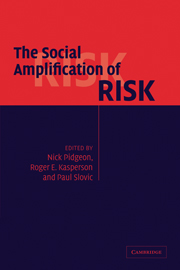Book contents
- Frontmatter
- Contents
- List of figures
- List of tables
- List of contributors
- Acknowledgments
- Introduction
- Part I Conceptual foundations
- Part II Risk signals and the mass media
- 5 Trust, transparency, and social context: implications for social amplification of risk
- 6 Risk and relativity: BSE and the British media
- 7 After amplification: rethinking the role of the media in risk communication
- 8 Plague and arsenic: assignment of blame in the mass media and the social amplification and attenuation of risk
- Part III Public perceptions and social controversy
- Part IV Risk ripples and stigma effects
- Part V Policy and management
- Bibliography
- Index
6 - Risk and relativity: BSE and the British media
Published online by Cambridge University Press: 06 July 2010
- Frontmatter
- Contents
- List of figures
- List of tables
- List of contributors
- Acknowledgments
- Introduction
- Part I Conceptual foundations
- Part II Risk signals and the mass media
- 5 Trust, transparency, and social context: implications for social amplification of risk
- 6 Risk and relativity: BSE and the British media
- 7 After amplification: rethinking the role of the media in risk communication
- 8 Plague and arsenic: assignment of blame in the mass media and the social amplification and attenuation of risk
- Part III Public perceptions and social controversy
- Part IV Risk ripples and stigma effects
- Part V Policy and management
- Bibliography
- Index
Summary
If we follow Popper's metaphors of the searchlight or the net, we recognize that there is always an element of selectivity about what we study linked to various purposes and interests. The question he always asked was “what is the problem?” This is why different disciplinary and interdisciplinary approaches can be found in the study of risk. Different problems are posed – though they may at some point be linked with other problems which others are trying to solve.
According to the German sociologist, Ulrich Beck, we now live in a “risk society”: obsessed with the risk of accidents, technological errors, ecological disaster, professional miscalculations, and scientific discoveries hurtling out of control (Beck 1995b). Risk has become a defining concept in public and political debate and the mass media are seen to play a key role in this social transformation. Pressure groups seek to attract media attention in their campaigns for safety measures, experts complain of media “scare-mongering,” industries and government bodies employ special “risk communicators” in an attempt to maintain (or woo) public confidence, and journalists themselves describe the attractions of scientific controversy and risk disputes (Adams 1992; Friedman et al. 1986; Hansen 1994; Sandman 1988).
Risk and the media
Several studies suggest that the media are paying increasing attention to scientific uncertainty and have been instrumental in generating public concern about particular threats (Cole cited in Goodell 1987; Goodell 1987; Peters 1995).
- Type
- Chapter
- Information
- The Social Amplification of Risk , pp. 138 - 155Publisher: Cambridge University PressPrint publication year: 2003
- 29
- Cited by



